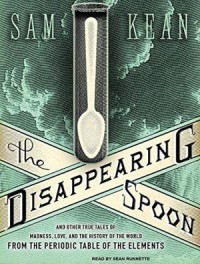

Date Published: August 18, 2010
Format: Audiobook (Tantor Audio)
Source: RB Digital/RAF Lakenheath Library
Date Read: January 3-5, 2019
BL's Flat Book Society book club pick for January 2019
Blurb:
Why did Gandhi hate iodine (I, 53)? Why did the Japanese kill Godzilla with missiles made of cadmium (Cd, 48)? How did radium (Ra, 88) nearly ruin Marie Curie's reputation? And why did tellurium (Te, 52) lead to the most bizarre gold rush in history?
The periodic table is one of our crowning scientific achievements, but it's also a treasure trove of passion, adventure, betrayal and obsession. The fascinating tales in The Disappearing Spoon follow carbon, neon, silicon, gold and every single element on the table as they play out their parts in human history, finance, mythology, conflict, the arts, medicine and the lives of the (frequently) mad scientists who discovered them.
Why did a little lithium (Li, 3) help cure poet Robert Lowell of his madness? And how did gallium (Ga, 31) become the go-to element for laboratory pranksters? The Disappearing Spoon has the answers, fusing science with the classic lore of invention, investigation, discovery and alchemy, from the big bang through to the end of time.
***********************************SPOILERS***************************************************
I listened to this book just before the amended date for the book club read because I had other bookish obligations this month and didn't want to miss reading this book. So if you are reading this book for the first time on the amended date, you might want to skip my review.
Review:
In full disclosure, this wasn't my pick for this month's book club choice (kind of had my heart set on reading The Sixth Extinction: An Unnatural History by Elizabeth Kolbert), but I am determined to read and participate fully in this book club in 2019. So here we go - wait, that title is quite a mouthful! Oh, it is about chemistry...okay, so the audiobook would be my best route. And it turned out it was, because if I read this book in print/ebook, I probably would've DNF'd by the third or fourth chapter. Major applause for the narrator in getting me through 12+ hours of chemistry!
So this book had its highlights, some lowlights, but mostly it was just okay. The chapters are sorted by breaking up the Periodic Table of Elements (PToE) into clusters of like elements, and then each chapter goes into discovery, history, and uses of each element in that cluster. There is one chapter early in the book that is more devoted to the reasons and history of word usuage/language development/common names of elements - this was the chapter that had me contemplating hitting the DNF button. Most of the history of the elements had to do with scientists' egos and the Nobel Prize awards; after awhile, these controversaries all blurred into one another. So many egos, fighting over the same award that was more political than scientific based. The highlights for me was the element's use in chemical warfare and radiological sections as well as Ghandi's hatred of salt and the Gold Rush in the US.
The book may not be in my science wheelhouse, but now I do want to read Kean's The Violinist's Thumb because I like his writing.

 3
3
